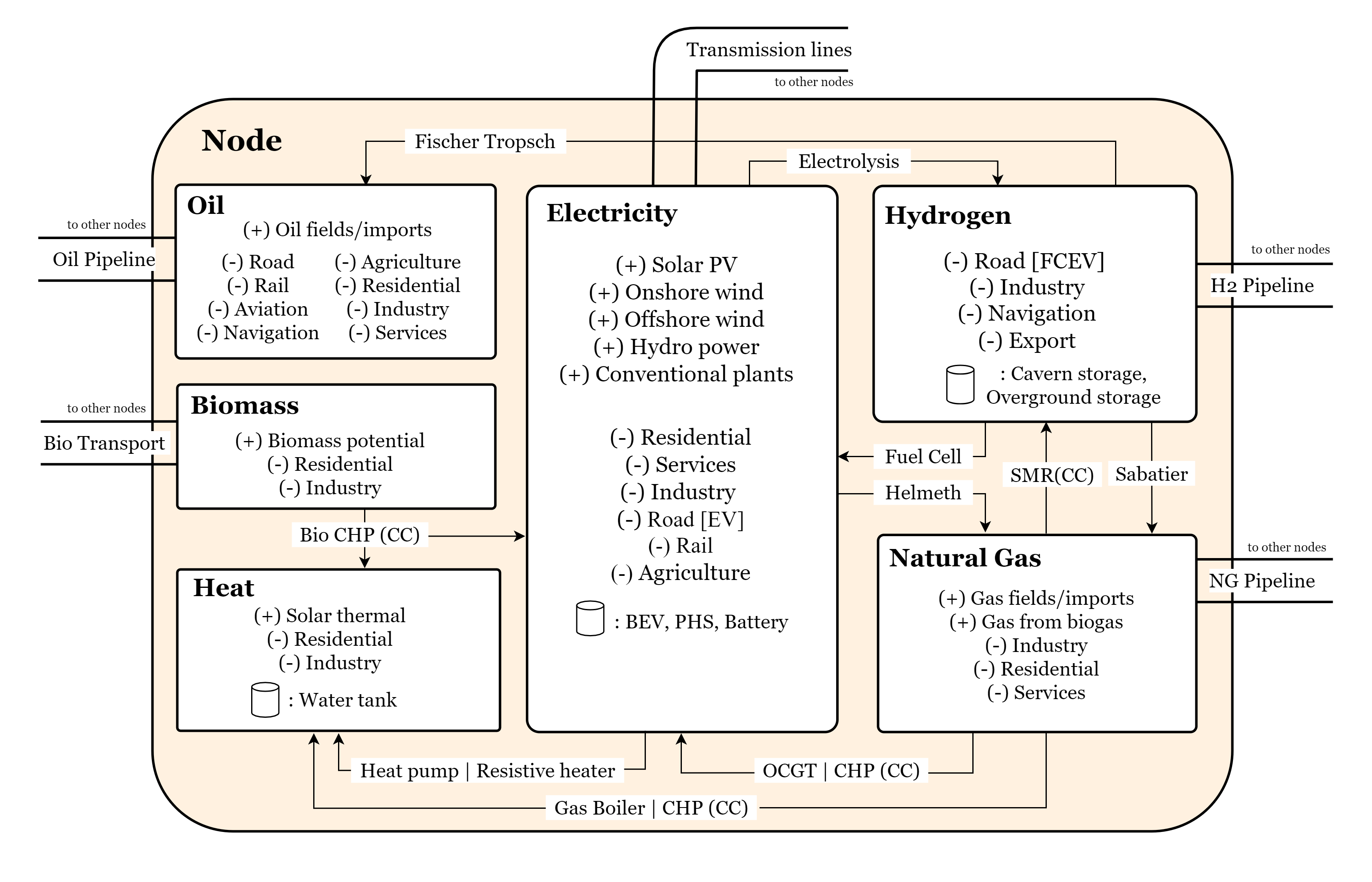Sector-coupled PyPSA-Earth: A Global Open Source Multi-Energy System Model
Development Status: Version 0.1
Sector-coupled PyPSA-Earth is the first of its kind: an open-source, sector-coupled energy system model with global coverage. It is designed to facilitate transparent analysis and informed decision-making for a sustainable energy future. The model's workflow leverages open datasets to customize the model according to the specific needs of any country or region, delivering complete optimization results that encompass policy, technical, economic, and environmental impacts. It is built on top of PyPSA-Earth, the two models are soon to be merged into one encompassing the scope of both models.
Our mission with Sector-coupled PyPSA-Earth is to empower stakeholders around the globe with the ability to transparently analyze and plan the transition to a decarbonized, integrated energy system. By making this tool openly available, we aim to foster collaboration, innovation, and informed policy-making that leads to sustainable and efficient energy solutions for the future.
The paper describing the model in details is currently under review. The preprint is already available here.
Key Features
Sector-coupled PyPSA-Earth model introduces several novel features that set it apart:
- Global Coverage: It is the first open-source model capable of simulating sector-coupled energy systems on a global scale.
- Adaptable Demand Projection Tool: The model includes a flexible tool for projecting energy demand, tailored to the specifics of the region or country under study.
- Global Geo-Asset Dataset: A comprehensive dataset compiled from open sources forms the backbone of the model, providing detailed insights into energy assets worldwide.
- Custom Dataset Integration: While the model extensively uses open datasets, it also allows for the easy integration of custom datasets, offering flexibility to users who have specific data at their disposal.
The diagram below depicts one representative clustered node showing the combination of carriers and sectors covered in the model as well as the generation and conversion technologies included.

Installation
-
Open your terminal at a location where you want to install pypsa-earth-sec. Type the following in your terminal to download the package and the dependency (pypsa-earth) from GitHub. Note that the tag
--recursive-submodulesis needed to automatically clone also the pypsa-earth dependency..../some/path/without/spaces % git clone --recurse-submodules https://github.com/pypsa-meets-earth/pypsa-earth-sec.gitTo make sure you run the latest version of the submodule (if desired), run the following command to update the git submodules:
.../some/path/without/spaces % git submodule update -
Move the current directory to the head of the repository.
.../some/path/without/spaces % cd pypsa-earth-sec -
(optional) For reproducibility and compatibility purposes, it is possible to specify a specific version of the pypsa-earth submodule. To do so, feel to reproduce the following lines, yet this is not mandatory. If you desire to run the latest pypsa-earth model, please skip this point 3.
.../pypsa-earth-sec % cd pypsa-earth .../pypsa-earth % git reset --hard \{commit id\} .../pypsa-earth % cd .. -
The python package requirements are curated in the
envs/environment.yamlfile of the pypsa-earth repository. The environment can be installed using:.../pypsa-earth-sec % conda env create -f pypsa-earth/envs/environment.yaml -
For running the optimization one has to install the solver. We can recommend the open source HiGHs solver which installation manual is given here.
-
To use jupyter lab (new jupyter notebooks) continue with the ipython kernel installation and test if your jupyter lab works:
.../pypsa-earth % ipython kernel install --user --name=pypsa-earth .../pypsa-earth % jupyter lab
Test run
-
In the folder pypsa-earth-sec open a terminal/command window to be located at this path
./pypsa-earth-sec/ -
Rename config.default.yaml to config.yaml. For instance in Linux:
mv config.default.yaml config.yaml -
Open the file
config.yamland follow the steps done before in pypsa-earth- choose the country you want to model. For example
countries: ["MA"]
- choose the country you want to model. For example
-
Run a dryrun of the Snakemake workflow by typing simply in the terminal:
snakemake -j 1 solve_all_networks -nRemove the -n to do a real run. Follow the tutorial of PyPSA-Eur 1 and 2 on YouTube to continue with an analysis.




